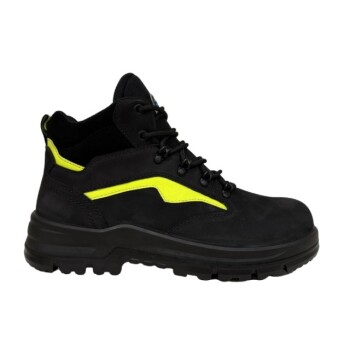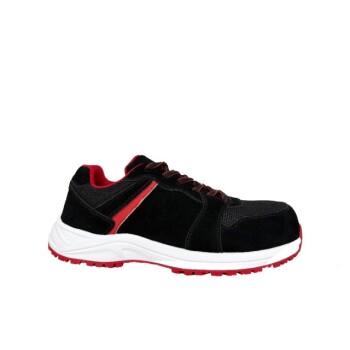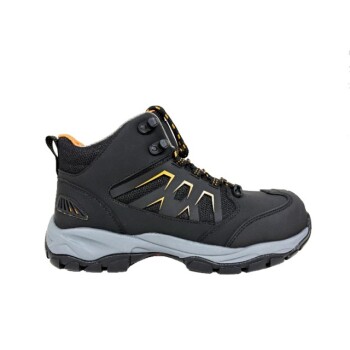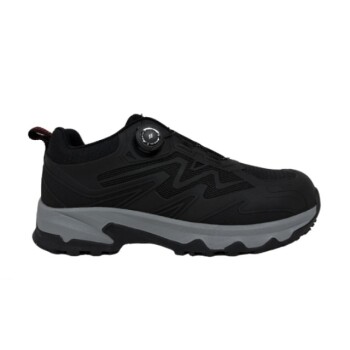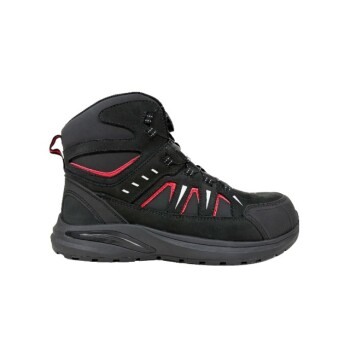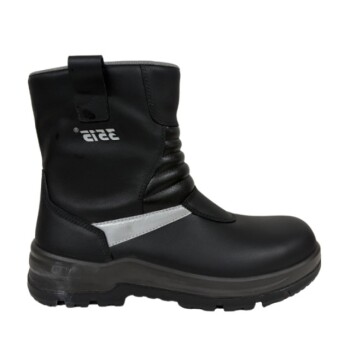The primary types of safety toes in work shoes are Steel, Composite, and Alloy. Each uses a different material to create a protective cap over the toes, designed to shield you from impact and compression injuries. The choice between them involves a crucial trade-off between maximum strength, weight, cost, and environmental factors like temperature or the presence of metal detectors.
Choosing a safety toe isn't just about protection; it's about finding the right balance of safety, comfort, and environmental suitability. While steel offers maximum strength, modern composite and alloy toes provide comparable safety ratings with significant benefits in weight and non-conductivity.
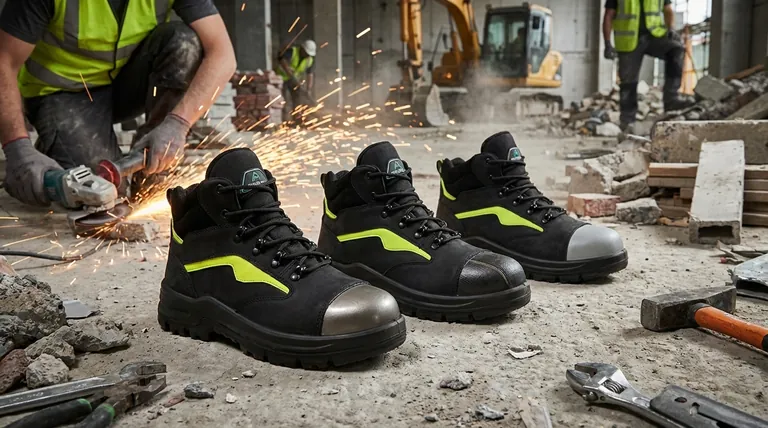
The Core Three: Steel, Composite, and Alloy
Your work environment and daily tasks will determine which of these materials is the right fit. Each one meets specific safety standards but achieves it in a different way.
Steel Toe: The Industry Standard
A steel toe cap is the traditional choice for safety footwear, made from heavy-duty steel. It has a long-standing reputation for providing the highest level of protection against heavy impact and compression.
This is the most common type found in heavy industrial, manufacturing, and construction settings where the risk of severe foot injury is high.
Composite Toe: The Modern Alternative
Composite toes are constructed from non-metallic materials like carbon fiber, Kevlar, fiberglass, or durable plastics. Their key advantage is being significantly lighter than steel.
Because they are non-metallic, they do not conduct electricity or transfer heat and cold. This makes them ideal for electricians or those working in extreme temperatures.
Alloy Toe: The Lightweight Metal
An alloy toe is made from lightweight materials like aluminum or titanium. It offers a unique balance of protection and comfort.
These caps provide the impact resistance of steel but at a fraction of the weight. They can also be made thinner, resulting in a more spacious and comfortable toe box.
Understanding the Key Trade-offs
Selecting the right safety toe requires a clear understanding of what you gain and what you give up with each option. The decision hinges on four key factors.
Protection vs. Weight
Steel offers the highest potential for raw impact and compression resistance, but it is also the heaviest option, which can lead to foot fatigue over a long day.
Alloy and Composite toes meet the same required safety standards (e.g., ASTM F2413 in the U.S.) but do so with less material and significantly less weight.
Cost and Durability
Steel toe footwear is often the most cost-effective and is exceptionally durable due to the inherent strength of the material.
Alloy toes are typically the most expensive option due to the higher cost of titanium and aluminum. Composite toes generally fall between steel and alloy in price.
Conductivity and Environment
Steel and alloy are metals and will conduct temperature, making your feet feel colder in winter and hotter in direct sun. They will also set off metal detectors.
Composite toes are non-conductive. This makes them the only suitable choice for electricians or employees who must pass through metal screening in high-security environments.
Beyond the Toe Cap: Additional Protection
While the toe cap is critical, it's part of a larger system of foot protection. Understanding related features gives you a complete picture of workplace safety.
Metatarsal Guards (Met Guards)
This feature adds a shield over the top of your foot—the metatarsal bones—protecting a much larger area from drop hazards.
Met guards can be built internally or externally and are crucial for jobs in logging, welding, or heavy manufacturing where objects can fall on the entire foot.
The Soft Toe Baseline
It is also important to recognize soft toe shoes, which have no protective toe cap at all.
These are only suitable for work environments where there is no risk of foot injury from falling or rolling objects.
Making the Right Choice for Your Job
Your specific work environment and daily physical demands should be the primary drivers of your decision.
- If your primary focus is maximum impact protection and cost-effectiveness: Steel toe is the proven, traditional choice for heavy construction and manufacturing.
- If your primary focus is working in extreme temperatures or secure facilities: Composite toe offers excellent protection without conducting heat, cold, or electricity, and it won't trigger metal detectors.
- If your primary focus is all-day comfort and reduced fatigue: Alloy toe provides steel-like protection at a significantly lower weight, making it ideal for workers who are constantly on the move.
By understanding these fundamental differences, you can select a work shoe that provides not just compliance, but true safety and comfort for your specific needs.
Summary Table:
| Safety Toe Type | Best For | Key Advantage | Key Consideration |
|---|---|---|---|
| Steel Toe | Heavy industry, construction | Maximum impact protection | Heaviest option; conducts temperature |
| Composite Toe | Electricians, extreme temperatures, secure sites | Lightweight; non-conductive | Generally more expensive than steel |
| Alloy Toe | All-day comfort, reduced fatigue | Steel-like protection at a lighter weight | Most expensive option; conducts temperature |
Need the right safety toe for your workforce?
As a large-scale manufacturer, 3515 produces a comprehensive range of safety footwear for distributors, brand owners, and bulk clients. We can help you select or custom-manufacture the perfect work boots—whether you need the maximum protection of steel, the lightweight comfort of alloy, or the non-conductive properties of composite.
Contact our experts today to discuss your specific needs and get a quote.
Visual Guide
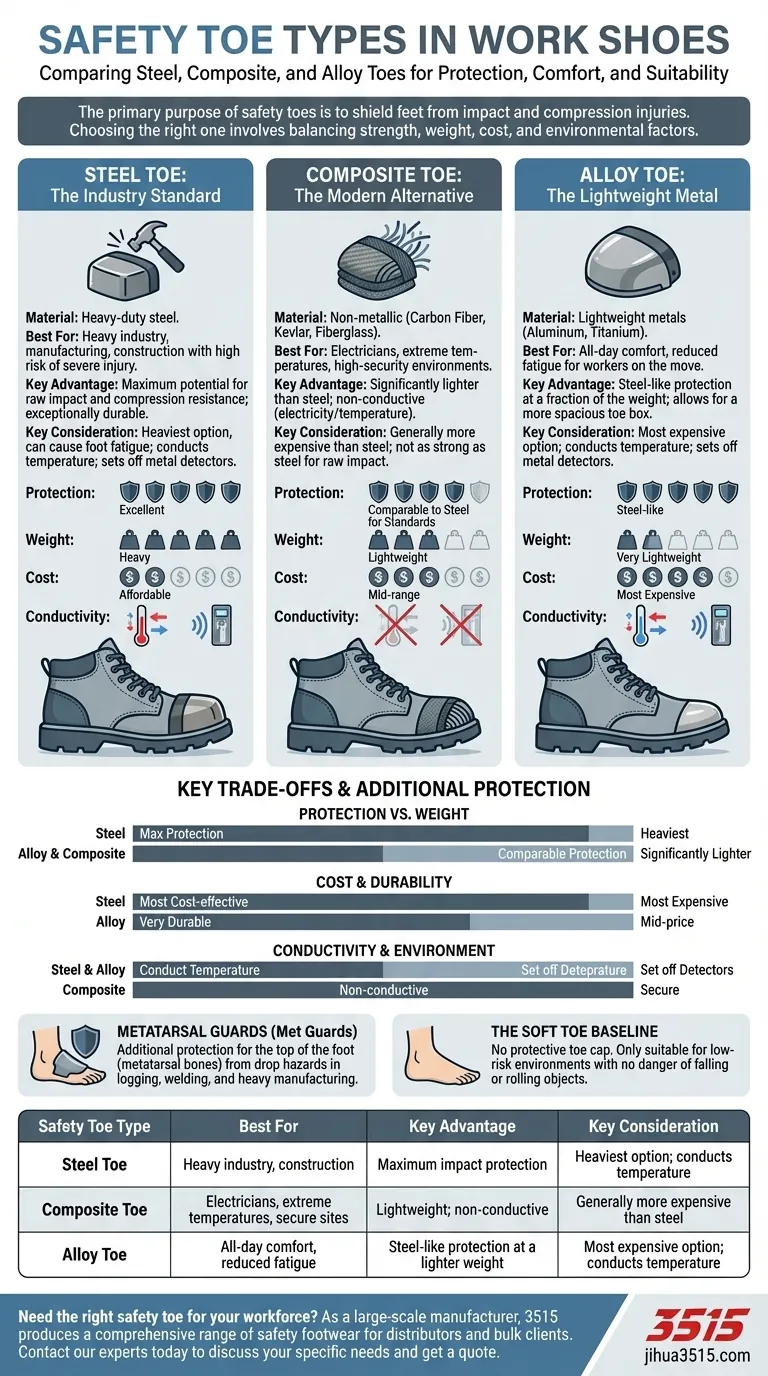
Related Products
- Wholesale Premium Waterproof Nubuck Safety Shoes Boots
- Premium Suede Sport Safety Shoes for Wholesale & Bulk Orders
- Premium Wholesale Wheat Nubuck Safety Boot with Rapid Lacing System
- Premium Sport Style Safety Boots for Bulk Orders
- Premium Grain Leather Safety Boots for Bulk Supply
People Also Ask
- What are the key safety features to consider when choosing work boots? Ensure Maximum Protection for Your Job
- How do safety boots reduce cutting hazards? Essential Protection for Your Workforce
- What types of safety shoes are appropriate for different work environments? Choose the Right Protection for Your Job
- What safety boots are recommended for the construction industry? Ensure Maximum Protection on the Job Site
- What protection do work boots offer against sharp objects? Your Guide to Puncture-Resistant Footwear
